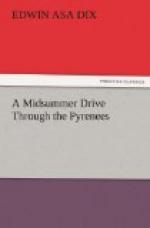We turn to the right, and emerge from the park, into the main promenade of the town. This is the Allee d’Etigny. It sets the type of these noted Luchon streets,—unusually broad, overhung with a fourfold row of immense lime-trees, and bordered with hotels and with enticing and polychromatic shops and booths quite equal to those of Interlaken. These wide Allees give to the village one of its individual charms. There are several of them,—among others, the Allee de la Pique and the Allee de Pique, starting one from each end of the Allee d’Etigny; these meet in an irregular figure, edged by villas and pensions, and everywhere green and shaded. Others lead out along the streams. This plenitude of shade is another of the place’s attractions; foliage is nowhere more abundant; trees stock the park, the streets, all the avenues of approach,—their cool canopy gratefully filtering the July sun.
The D’Etigny is clearly the chief of the Allees, and we make slow progress past its tempting booths and flower-stalls and solider emporiums. Promenaders are out in force; carriages are rolling forth from the town for a late afternoon drive or returning from an earlier; the omnibuses come clattering up from the arriving train; we have scarcely found such a joyous stir south of the boulevards of Paris.
It is of its own kind, this midsummer fashion, and, whether in its beach or mountain homes, as worthy to be absorbed and appropriated in its turn as the antiquity of Morlaaes or the silence of the Cirque. We enjoy it unresistingly, as we idle down the bright street, eyes and ears alert to its beauties and its harmonies.
But there is the seamy side to Luchon, as to many things on earth: you go but a few paces from these opulent Allees and you find poverty. Frowsy women stare at us from rickety houses in the old part of the town; children, no longer silk-sashed but dirt-stained and ignorant, play in the mud-heaps; patient old tinkers and cobblers are seen in the dim shops at work. The very poor rarely gain by the growth of their neighbors. These in Luchon seem not to feel envy, but they have no part nor heart in the pride of civic progress around them. They keep on along their stolid, uncomplaining ways, having long ago faced the fact that they were immovably at the bottom of Fortune’s wheel, and having forgotten since even to repine over it.




